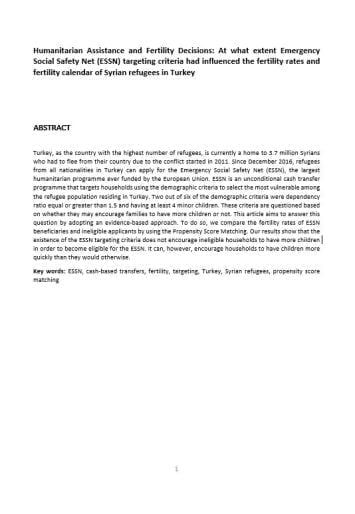Humanitarian Assistance and Fertility Decisions: At what extent Emergency Social Safety Net (ESSN) targeting criteria had influenced the fertility rates and fertility calendar of Syrian refugees in Turkey
Turkey, as the country with the highest number of refugees, is currently a home to 3.7 million Syrians who had to flee from their country due to the conflict started in 2011. Since December 2016, refugees from all nationalities in Turkey can apply for the Emergency Social Safety Net (ESSN), the largest humanitarian programme ever funded by the European Union. ESSN is an unconditional cash transfer programme that targets households using the demographic criteria to select the most vulnerable among the refugee population residing in Turkey. Two out of six of the demographic criteria were dependency ratio equal or greater than 1.5 and having at least 4 minor children. These criteria are questioned based on whether they may encourage families to have more children or not. This article aims to answer this question by adopting an evidence-based approach. To do so, we compare the fertility rates of ESSN beneficiaries and ineligible applicants by using the Propensity Score Matching. Our results show that the existence of the ESSN targeting criteria does not encourage ineligible households to have more children in order to become eligible for the ESSN. It can, however, encourage households to have children more quickly than they would otherwise.
